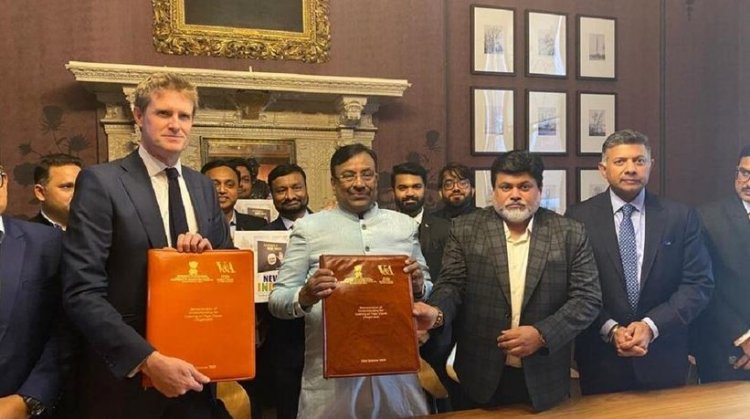London: Maharashtra Minister for Cultural Affairs Sudhir Munganitwar on Tuesday signed a memorandum of understanding (MoU) with the Victoria and Albert (V&A) Museum in London for a 17th century Tiger Claws' weapon believed to have belonged to Chhatrapati Shivaji Maharaj make a journey back to India for a historic exhibition.
Munganitwar signed the pact with Dr Tristram Hunt, Director of the V&A, at a meeting at the museum.
It's a day of great happiness and celebration for all of us Indians, said Munganitwar.
The MoU is in place for the historic wagh nakh of Shivaji Maharaj to be part of our 350th anniversary celebrations. We now hope after the required processes, it will be available for our darshan in a few months' time, he said, speaking in Hindi on the sidelines of a diaspora event organised by the Maharashtra Mandal in London in celebration of the MoU signing.
Hunt hailed the historic partnership between the V&A, the government of Maharashtra and the Chhatrapati Shivaji Maharaj Vastu Sangrahalaya (CSMVS) museum in
Mumbai, which will enable the unique object to form part of celebrations in India next year.
Given their fascinating heritage, I hope that the displays across Maharashtra and the accompanying events will help support new research into the Tiger Claws' history and provenance, said Dr Tristram Hunt, Director of the V&A.
We look forward to working with colleagues to finalise plans in the months ahead, he said.
According to the V&A, the MoU sets out the details of a three-year loan agreement for the unique pair of Tiger Claws or wagh nakh in the V&A collection. They are described as an example of a weapon that was popular in the 17th century.
This particular set has long drawn interest from scholars due to the leather case which was made for them in the 19th century by their owner at the time, which claims that they are the same Tiger Claws used by Chhatrapati Shivaji Maharaj during the Maratha leader's historic battle and triumph over Azfal Khan in 1659, the V&A said.
The signing of the agreement on Tuesday is the first step in the process which, following a formal loan agreement being finalised later this year, will enable the Tiger Claws to travel to multiple destinations across India to feature in commemorative events planned next year to mark the 350th anniversary of Chhatrapati Shivaji Maharaj's coronation.
During a protracted military engagement in 1659, the legendary Maratha leader held metal claws, or wagh nakh, concealed in his hand and is said to have disembowelled his opponent Afzal Khan the commander of the opposing Bijapur army.
It is believed, though unverified, that the set of claws then came into the possession of James Grant Duff, an officer of the East India Company who was appointed Resident or political agent of the Satara state in 1818 and gifted to the V&A by a descendant.
The story of Chhatrapati Shivaji Maharaj's triumph over Afzal Khan is legendary, so we are delighted that the Tiger Claws' will return to India as part of the 350th-anniversary events where they can be enjoyed as part of the celebrations. We hope that their display might also enable new research into their history and look forward to working in partnership with colleagues in the months ahead as we develop plans for their display, a V&A spokesperson said.
The MoU coincides with Maharashtra's 350th anniversary celebrations of the coronation of Chhatrapati Shivaji. It is then expected to be dispatched to India later this year for an agreed period.
According to historical accounts, Shivaji and Afzal Khan had arranged a truce after political upheavals in order to meet in a tented enclosure, virtually alone.
The V&A description of the history of the 'Tiger Claws' explains: Both came armed: Shivaji wore mail under his clothes and metal skull protection under his turban. He also held a metal Tiger Claws' weapon concealed in his hand. The two men fought, and Shivaji disembowelled his opponent.
The last Peshwa (Prime Minister) of the Marathas, Baji Rao II, surrendered to the British in June 1818 after defeat in the Third Anglo-Maratha War and was banished to Bithoor near Kanpur. It is possible he also surrendered this weapon to Grant Duff.



